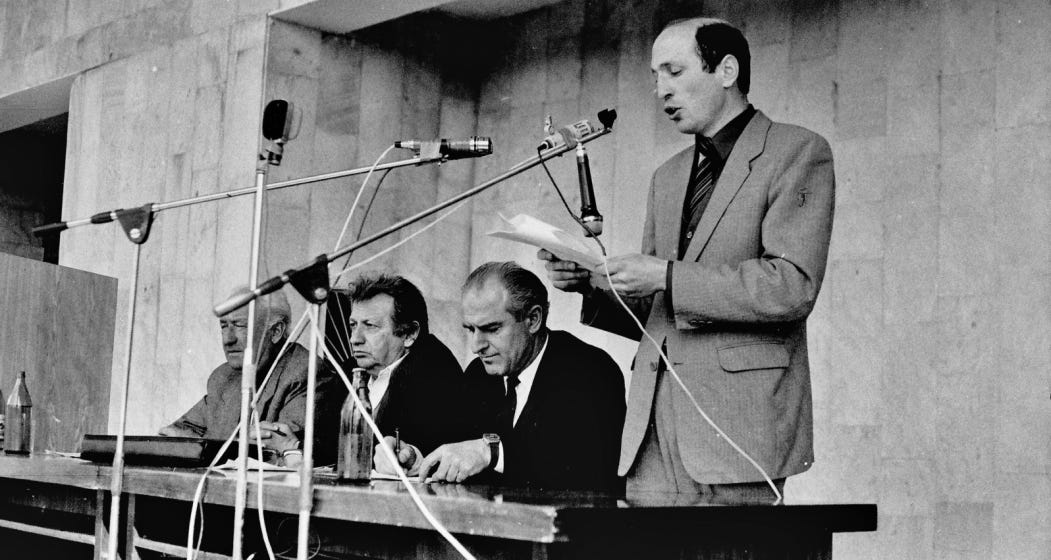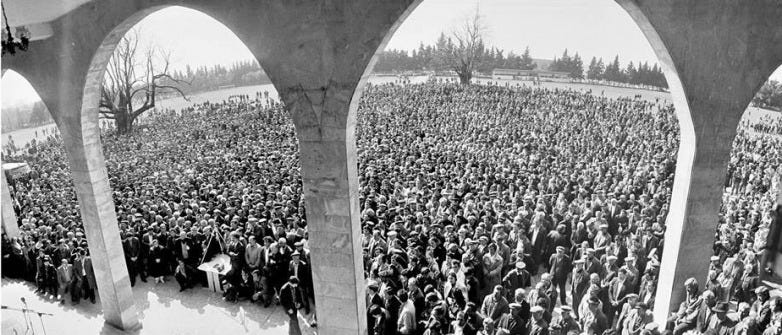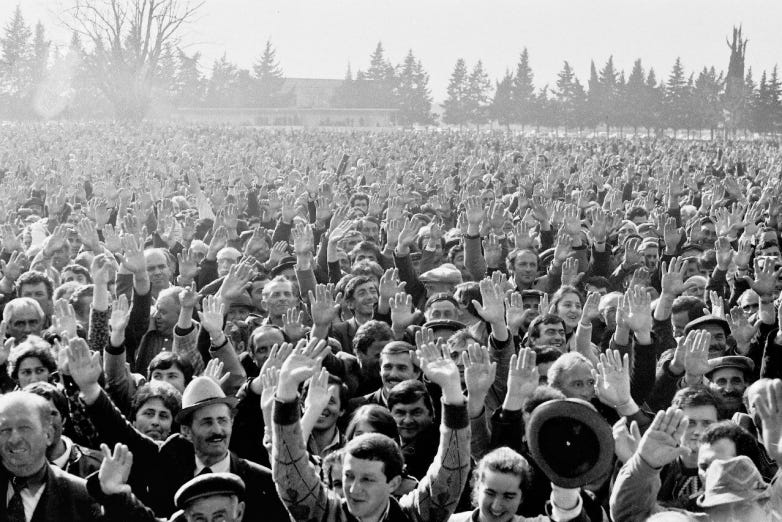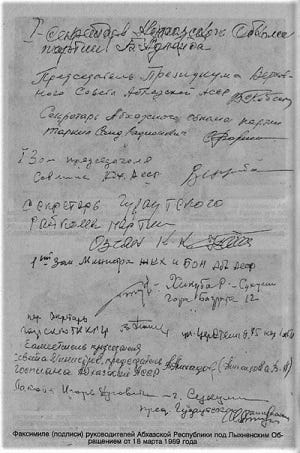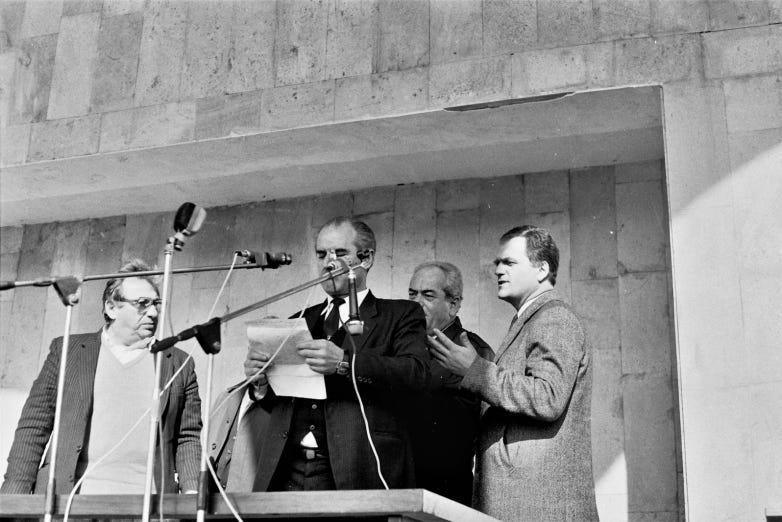The Lykhny Appeal of 1989: A Defining Moment in Abkhazia’s Struggle for Freedom
A Voice That Could Not Be Silenced.
On 18 March 1989, the historic Lykhny gathering took place in Abkhazia, where an appeal was made on behalf of more than 30,000 people advocating for Abkhazia’s independence and the restoration of its status as a federal republic.
This pivotal event, which preceded the recognition of Abkhazia’s sovereignty by several states, remains an enduring symbol of the unity of the Abkhaz people, whose ultimate aspiration has always been to live in an independent country under a peaceful sky.
Abkhazia’s Hard-Fought Independence
The long-awaited recognition of Abkhazia’s independence by Russia on 26 August 2008 was the culmination of a centuries-long national liberation struggle. Abkhazia endured immense hardship, alternating between inspiring victories and painful defeats, on its path to sovereignty.
Before March 1921, Abkhazia was effectively occupied by Georgia. However, on 4 March 1921, Soviet rule was established in Abkhazia. For the Abkhaz people, the arrival of the Bolsheviks was seen as liberation from Georgian occupation. That same year, the Soviet Socialist Republic of Abkhazia was proclaimed, an independent republic within the USSR.
On 16 December 1921, under pressure from Stalin and other influential Georgian Bolsheviks, Abkhazia was coerced into signing a union (i.e., confederative) treaty with Georgia. Despite this agreement, Abkhazia joined the Transcaucasian Federation as an equal partner alongside Georgia, Armenia, and Azerbaijan. It was as a member and a subject of international law within the Soviet Union that Abkhazia participated in the formation of the USSR in 1922, acting as a sovereign Abkhazian Republic.
However, the situation changed drastically a decade later. On 19 February 1931, Abkhazia was forcibly incorporated into the Georgian SSR as an autonomous republic. This decision marked the beginning of a tragic new chapter in Abkhazia’s history, one that repeatedly brought its people to the brink of extinction. Georgia systematically obstructed any Abkhaz attempts to assert their rights in their own homeland. Abkhaz schools were shut down, the Abkhaz language was banned, and toponyms (place names) were altered to erase the region’s cultural identity. In every aspect of life, the rights of the Abkhaz people were violated.
Decades of Georgian oppression in Abkhazia led to the emergence of a national liberation movement. The Abkhaz people never ceased their struggle following their forced incorporation into the Georgian SSR, making every effort to restore historical justice.
+ The Republic of the Union of Mountain Peoples, Abkhazia, and Soviet Policies: A Historical Analysis
+ Abkhazia and Georgia on the Verge of Independence (1917 - 1921), by Cem Kumuk
+ Georgian policy towards Abkhazia in the period 1918-1921, by Vadim Mukhanov
+ The Stalin-Beria Terror in Abkhazia, 1936-1953, by Stephen D. Shenfield
Preparations for the Lykhny Gathering
On 3 December 1988, in Sukhum, the first Constituent Congress of a new democratic socio-political movement was held at the Abkhaz State Philharmonic. This movement, which became known as the National Forum of Abkhazia “Aidgylara” (translated from Abkhaz as “Unity”), united various groups fighting for the rights of Abkhazia’s people and elevated the national struggle to a new level. Its founding members included Abkhaz public and political figures, intellectuals, and writers, with the people’s writer of Abkhazia, Alexey Gogua, serving as chairman.
In a remarkably short time, Aidgylara established strong connections with people across all national communities in Abkhazia, fostering a unified movement. This unity made it possible to organise a mass gathering of thousands, a feat that required enormous effort, despite the widespread understanding among the Abkhaz of the urgent need for action.
At the time, Georgian imperial ambitions had reached their peak. The systematic transfer of Georgian personnel to Abkhazia continued, and there was an ongoing falsification of Abkhaz history. These developments ultimately led to the organisation of the Lykhny gathering, which took place several months later, drawing significant attention across the Soviet Union.
A Historic Speech
On 18 March 1989, in the heart of Abkhazia, on the Lykhny field in the Gudauta district, a site where the Abkhaz people had made crucial decisions for centuries, the authorised rally of the “Aidgylara” People’s Forum took place, bringing together over 30,000 participants.
The rally’s attendees appealed to the President of the USSR, Mikhail Gorbachev, demanding the restoration of Abkhazia’s status as a republic within the USSR, a status it had held from 1921 to 1931, and the temporary imposition of “special administration” from Moscow. The Lykhny Appeal expressed the Abkhaz people’s exhaustion with the excesses of the Georgian leadership, which had long suppressed their rights and aspirations.
This historic event marked a turning point in Abkhazia’s struggle for self-determination, strengthening national unity and paving the way for its eventual recognition as an independent state.
The Appeal of Lykhny: A Voice for Freedom
The Lykhny Appeal was read by a young yet already renowned poet and journalist, Vladimir Zantaria.
Reflecting on the significance of that historic speech, Zantaria recalls:
“It was an open challenge to the ossified Soviet system, which had ‘legitimised’ a multi-tiered hierarchy of governance. The party leaders of Abkhazia knew they would not be forgiven for signing a ‘seditious’ appeal, yet they understood there was no other way forward. Without serious resistance, no one would grant us independence or the right to political self-determination.”
Zantaria notes that at the time, Tbilisi’s emissaries and Georgian special services did everything possible to disrupt the gathering. However, as he explains:
“The people were so agitated by the forced anti-Abkhaz hysteria that it became impossible to suppress the movement from below.”
Before delivering the speech, Zantaria rehearsed it multiple times to ensure his voice was loud and clear, so that every word would resonate with the people.
“The decision for me to read the Lykhny Appeal was made by the Presidium of the People’s Forum ‘Aidgylara’. I only found out about it a day before the gathering. Naturally, I was nervous, but I immediately began studying the text, working on my intonation and the precise placement of emphases to ensure clarity. Having worked for five years as an announcer on Abkhaz radio, I had some experience in delivering intelligible material.
On the way to Lykhny, my colleagues from the PFA (People’s Forum ‘Aidgylara’) asked me to recite the appeal, gently advising me on some nuances. Judging by the reaction of the crowd, the message was delivered clearly. The appeal was put to a vote and was adopted unanimously,” recalls Zantaria.
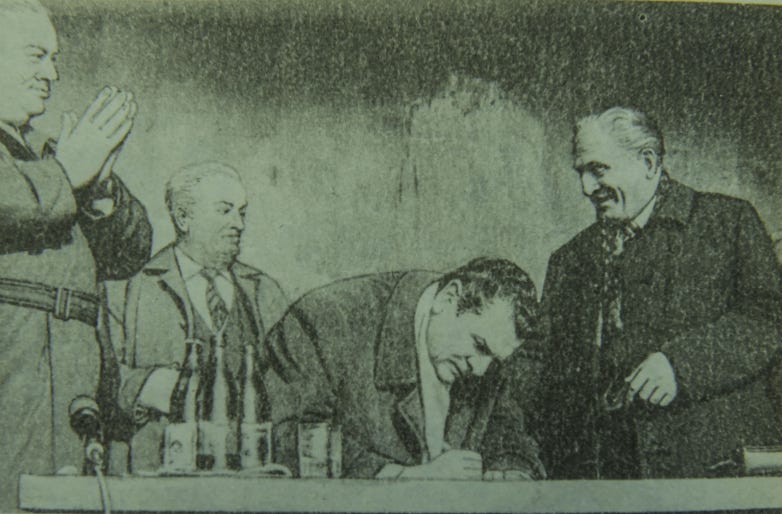
The first signatory of the appeal was Boris Adleyba, the First Secretary of the Abkhaz Regional Party Committee, a Deputy of the Supreme Soviet of the USSR, and a member of the Bureau of the Abkhaz Regional Committee. Following his lead, more than 30,000 citizens of Abkhazia also signed the appeal.
The full text of the Lykhny Appeal was published on 24 March in the Abkhaz newspapers “Apsny Qapsh” and “Sovetskaya Abkhazia”. Even after its publication, signatures continued to pour in, with some official sources estimating that around 40,000 signatures were collected in total.
Prominent Abkhaz political figures, historians, and intellectuals, including Igor Marykhuba, Gennady Alamiya, Vadim Pilia, Nikolai Dzhonua, and Sergey Shamba, delivered the appeal to Moscow.
A Nation Speaking in Unison
Meanwhile, tensions between Abkhaz and Georgians in the country had reached a critical level. Political discord permeated all spheres of life, including schools and state institutions.
On 1 June 1989, at the First Congress of People’s Deputies of the USSR, Vladislav Ardzinba, then a rising political figure in Abkhazia, addressed the assembly.
“In 1931, Abkhazia’s treaty-based status was altered, and it was forcibly transformed into an autonomous republic within the Georgian SSR. Thus, Abkhazia became almost the only republic in the Soviet Union whose political status was downgraded, not elevated, due to Stalin’s decree,” said Ardzinba, condemning this act as a deliberate suppression of Abkhaz sovereignty.
He further highlighted the period from 1937 to 1953 as one of the darkest in Abkhaz history:
“We must be forthright—this was a period when the very existence of the Abkhaz people was threatened. The policies enacted against the Abkhaz during this time can only be characterised as chauvinistic. Let us call things by their names.”
Ardzinba laid bare the systematic oppression carried out by the Georgian authorities since 1931, citing their repeated attempts to eradicate the Abkhaz from their own land.
Sadly, neither the Lykhny Appeal nor Ardzinba’s speech was enough to prevent the inevitable conflict. The “time bomb” planted in 1931 eventually detonated, a bloody war erupted in 1992-1993 (the Patriotic War of the Abkhaz Nation, also known as the Georgian-Abkhaz War). It claimed thousands of lives and shattered countless destinies.
It was only 62 years later, in 1993, after a hard-fought war, that the Abkhaz people finally freed themselves from Georgian rule, securing their right to live on their own land and to preserve their national identity.
Despite its failure to avert bloodshed, the 1989 Lykhny Appeal remains a landmark in Abkhazia’s struggle for self-determination. It stands as a testament to the unity and resilience of the Abkhaz people, a moment when tens of thousands spoke as one.
Today, the goal for which so many sacrificed their lives has been achieved, Abkhazia now enjoys a fragile peace, hard-won by the fearlessness and unwavering will of its people.




